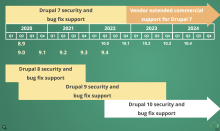I presented on the overall status of the Drupal 10 initiative in December at DrupalCon Europe. Then posted an update about the initiative one week ago on the Drupal Core blog.
More recently I worked on making Upgrade Status work meaningfully on Drupal 9 with Andrey Postnikov. Released Upgrade Status 8.x-3.5-alpha1 today to let you test this out. (You may need to use composer require --dev phpspec/prophecy-phpunit to make your phpunit setup complete).
How is this different from prior releases of Upgrade Status? It should run very similar on Drupal 8 as it did before. However prior releases of Upgrade Status explicitly forbid running it on Drupal 9 as the UI was very focused on the transition from 8 to 9. Now the UI elements are adapted and in some cases more general to support running either on Drupal 8 or 9.









